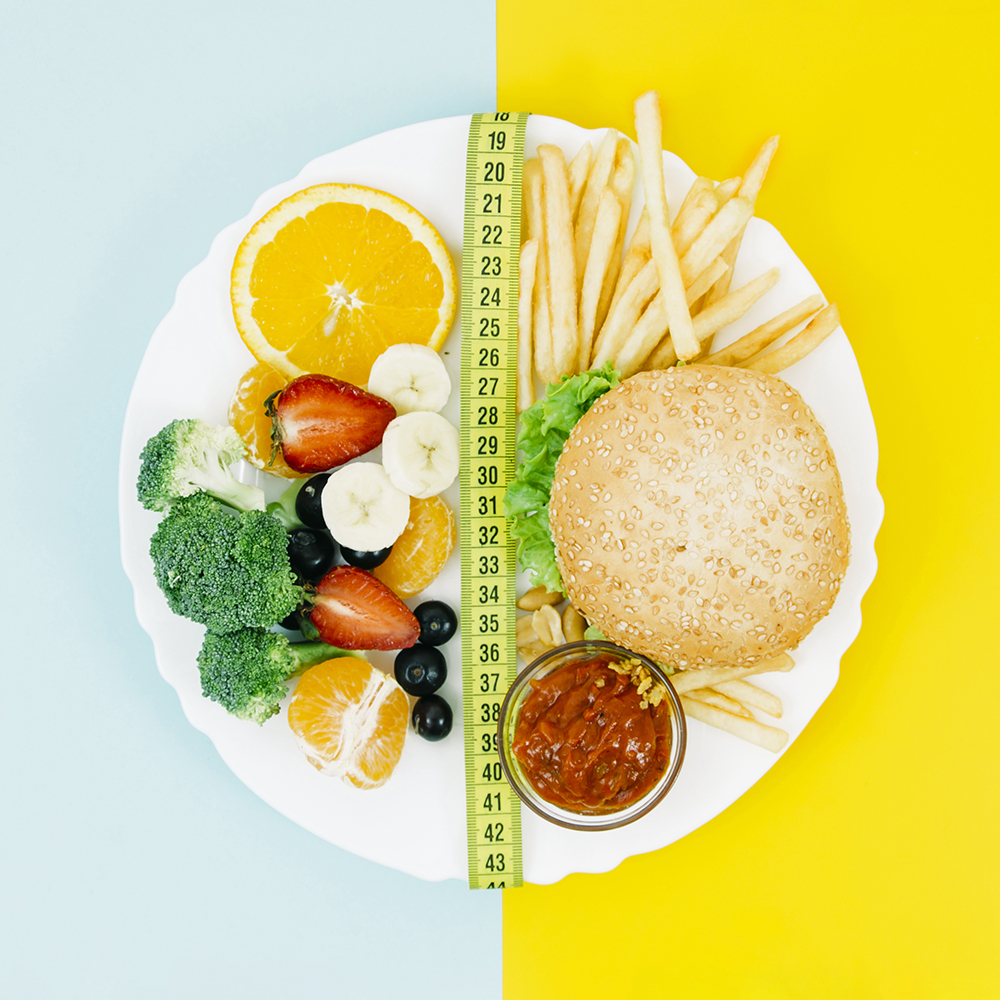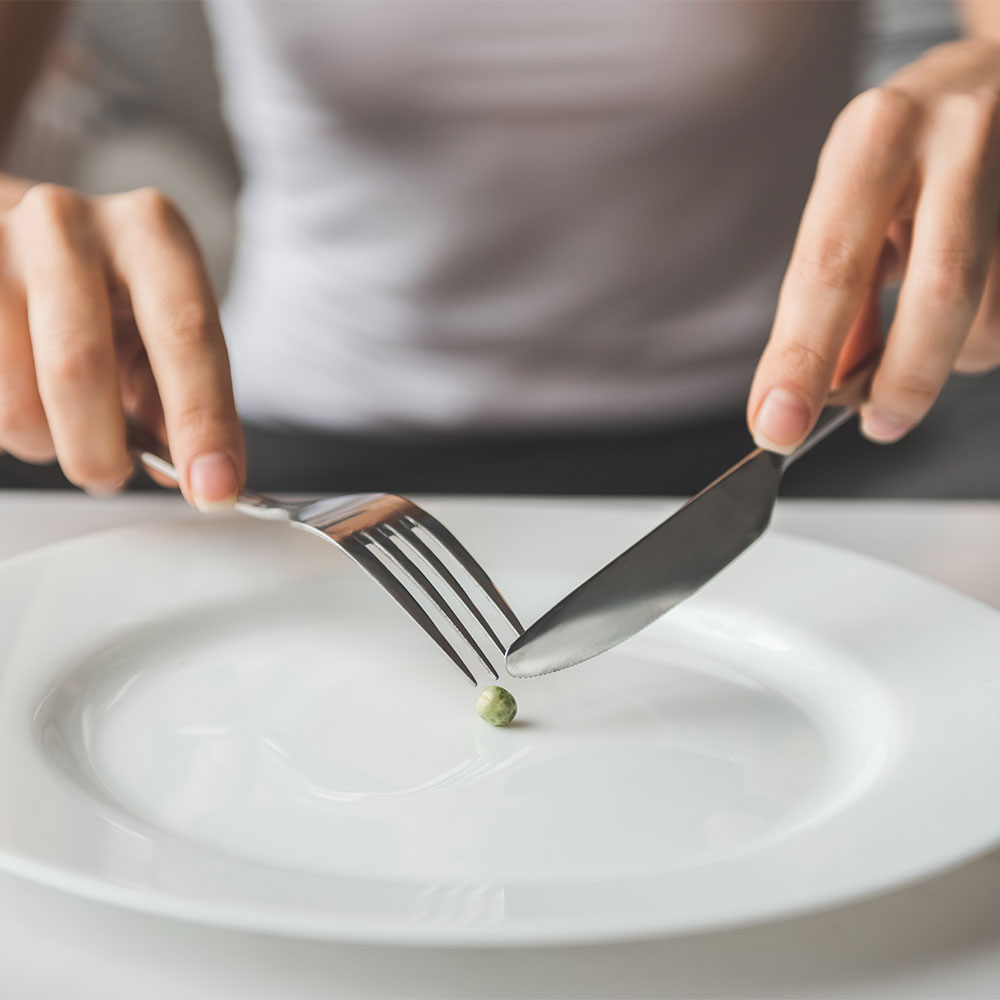Weight loss and dieting are some of the trending search terms with high click-through rates on the Internet all year round. Losing weight is not easy for many people. That’s because weight loss is indeed a long way. Therefore, before you start to lose weight, you must do your homework by understanding the basics of weight loss and knowing yourself and the enemy so you can get twice the results with half the effort and achieve better weight loss effect!
What are calories?
Knowing calories is the first step in managing your weight. Calories are a unit of energy used to measure the energy content of the food you eat and the beverage you drink. Calories are often measured in kilocalories (KCALs) or kilojoules (kJ) and are our commonly used heat units. The unit conversion between them is as follows:
- 1 calorie = 1 kcal = 1,000 calories
- 1 kilojoule = 1,000 joules
- 1 calorie/1 kcal/1 kcal = 4.184 kJ
There are four sources of calories – carbohydrates, fat, protein, and alcohol. Simply put, anything we eat on a daily basis from our food to the beverages we drink all contain calories. Only plain water does not contain calories.
Carbohydrates are the main source of calories in the human diet. Each gram of carbohydrates provides 4 calories, while fat provides more than twice the calories of carbohydrates, and each gram of fat provides 9 calories. The heat produced by protein is the same as that of carbohydrates. Each gram of protein provides 4 calories; as for alcohol, it provides 7 calories per gram.
Carbohydrates are the main source of calories in the human diet. Each gram of carbohydrates provides 4 calories, while fat provides more than twice the calories of carbohydrates, and each gram of fat provides 9 calories. The heat produced by protein is the same as that of carbohydrates. Each gram of protein provides 4 calories; as for alcohol, it provides 7 calories per gram.
The most intuitive role of weight and calories
The principle of weight loss is nothing more than to balance the ins and outs of calories. Knowing the balance of calories from your diet and the calories consumed will give you a better idea of how to manage your weight effectively.
- Energy intake = Energy consumption, the balance of calories in and out of the body while weight remains unchanged
- Energy intake < Energy consumption, the body needs to burn fat to provide energy and weight will drop
- Energy intake > Energy consumption, the body absorbs the excess calories and converts them into fat and stores them in the body, which will then increase weight
Remember, calories are just a unit of measurement. Different ingredients can make the same type of food contain different amounts of calories. Why is this happening? Our intestines absorb almost all the calories in the carbohydrates, fats, and proteins you eat. However, our intestines do not absorb all the calories from fibre (a type of carbohydrate). This is because fibre is difficult to be completely digested so our intestines only absorb half of the fibrous calories. Therefore, if the same calorie food has a high fibre content, the high fibre content will reduce the calorie absorption by half.
However, fibre can easily absorb moisture. The characteristics of fibre increases the intake of fibre in your diet and will not only make you feel full longer but it can also help you reduce the calories you eat or be absorbed. Coupled with the numerous health benefits of fibre, the Ministry of Health recommends that adults should consume at least 25 grams of fibre daily.
Our body needs to consume a certain amount of calories every day to effectively produce metabolism and make the body work normally. As a result, adults with normal activity levels are recommended by the Ministry of Health to consume the following calories daily to achieve this benefit:
However, fibre can easily absorb moisture. The characteristics of fibre increases the intake of fibre in your diet and will not only make you feel full longer but it can also help you reduce the calories you eat or be absorbed. Coupled with the numerous health benefits of fibre, the Ministry of Health recommends that adults should consume at least 25 grams of fibre daily.
Our body needs to consume a certain amount of calories every day to effectively produce metabolism and make the body work normally. As a result, adults with normal activity levels are recommended by the Ministry of Health to consume the following calories daily to achieve this benefit:
- 2,500 KCAL for men
- 2,000 KCAL for women
What is the Basal Metabolic Rate (BMR)?
We often hear people say that in order to lose weight successfully, it is necessary to improve the body’s metabolic capacity. Did you know that even when we are asleep, the major organs of the body are still working, such as your heartbeat, breathing, gland secretion, maintaining body temperature, and other basic physiological activities to maintain life? These basic physiological activities are also known as “basic metabolism”.
Basal metabolic rate (BMR) refers to the amount of calories consumed by the body to maintain the basic physiological activities as mentioned above under static conditions. In other words, if your basic metabolic rate is 1,500 calories even if you sleep all day without doing any other activities, you will still consume 1,500 calories for basic metabolism throughout the day.
Basal metabolic rate (BMR) refers to the amount of calories consumed by the body to maintain the basic physiological activities as mentioned above under static conditions. In other words, if your basic metabolic rate is 1,500 calories even if you sleep all day without doing any other activities, you will still consume 1,500 calories for basic metabolism throughout the day.
The basal metabolic rate varies with age, gender, body composition, and hormonal status, but will gradually decrease with age. Our basal metabolic rate generally starts to drop by 5-10% every 10 years after the age of 25. This is why many people gradually lose their shape after the age of 50 because when we reach that age, the basal metabolic rate has been by 15-30% by that time! As for gender, the basal metabolic rate for men is generally higher than that for women.
The basal metabolic rate can be used to represent the metabolic capacity of human cells. As the physiological functions of cells are different, their metabolic capacity will also be different. Generally speaking, the metabolism of bone tissue and adipose tissue is lower while the metabolism of lean tissue is higher. Therefore, the basal metabolic rate (BMR) is directly proportional to the lean body mass.
The basal metabolic rate can be used to represent the metabolic capacity of human cells. As the physiological functions of cells are different, their metabolic capacity will also be different. Generally speaking, the metabolism of bone tissue and adipose tissue is lower while the metabolism of lean tissue is higher. Therefore, the basal metabolic rate (BMR) is directly proportional to the lean body mass.
Avoid excessive dieting
This is why hunger strikes and consuming too few calories should be avoided for weight loss. Dieting can cause muscle loss and reduce the amount of lean muscle tissue, resulting in a reduced basal metabolic rate. Excessive dieting or constant hunger strikes can cause the body to create a protective mechanism to reduce basal metabolism and reduce calorie consumption to store calories while protecting the body and maintaining life. Therefore, dieting alone cannot effectively lose weight. This method of weight loss will only gradually slow down the rate of weight loss and eventually enter a plateau.
An effective way of promoting the body’s metabolic capacity is through exercise. Exercising can prevent the loss of lean muscle tissue and increase the amount of lean muscle tissue, thus improving the foundation of metabolic rate. It is recommended that you use a BMR computer to calculate your basal metabolic rate. Once you understand your basal metabolic rate, you can use appropriate diet control and reasonable amount of exercise to reduce weight and persevere in order to make the weight loss last longer.
An effective way of promoting the body’s metabolic capacity is through exercise. Exercising can prevent the loss of lean muscle tissue and increase the amount of lean muscle tissue, thus improving the foundation of metabolic rate. It is recommended that you use a BMR computer to calculate your basal metabolic rate. Once you understand your basal metabolic rate, you can use appropriate diet control and reasonable amount of exercise to reduce weight and persevere in order to make the weight loss last longer.


Effective weight loss
After understanding the basics of weight loss, we need to take the first step of declaring war against the “fats”. Set the weight goal you want to lose and calculate the energy you need to consume based on your weight management goal and energy requirement benchmark. Use the two-pronged approach of diet control and reasonable exercise to achieve effective weight loss. For example: if you want to lose one pound of weight, you have to properly control your daily dietary intake of calories while consuming 3,500 calories at the same time.
Reasonable diet control
Remember, diet control is not a diet but to reduce the total daily dietary calorie intake while rejecting high-calorie foods and sweets, such as fried foods, cakes, desserts, and processed foods. Use high-fibre and low-calorie coarse grains as your staple food and prepare them with less oil, less salt, and less sugar, and with a balanced intake of carbohydrates, vegetables, protein, and fat. You should also pay more attention to the information on the food packaging and make wise choices based on the nutrition labels. This will help you plan meals and snacks to meet your daily calorie needs. You can try to eat smaller meals more often and supplement with vitamins and minerals.
You can also eat more natural “burning aid” foods, such as red pepper, coffee, green tea, water, vinegar, beans, and other high-protein foods to accelerate your metabolism and promote the body’s synthesis and decomposition ability. Composed of a variety of natural plant extracts, including red orange active essence, extracts of guarana, rosemary, olive oil, and black beans, Elken Taiwan’s Trigen-S is a breakthrough natural “burning aid”, “powder-like formula” that is non-medicinal. Tested by the Research Centre of the University of Murcia in Spain, it is found that it does not only stimulate thermogenesis around the clock but also effectively improves metabolism.
You can also eat more natural “burning aid” foods, such as red pepper, coffee, green tea, water, vinegar, beans, and other high-protein foods to accelerate your metabolism and promote the body’s synthesis and decomposition ability. Composed of a variety of natural plant extracts, including red orange active essence, extracts of guarana, rosemary, olive oil, and black beans, Elken Taiwan’s Trigen-S is a breakthrough natural “burning aid”, “powder-like formula” that is non-medicinal. Tested by the Research Centre of the University of Murcia in Spain, it is found that it does not only stimulate thermogenesis around the clock but also effectively improves metabolism.


Proper exercise
Exercise can effectively burn calories but to achieve significant weight loss, you must persevere. Discover your favourite physical activities and then determine how many calories you can burn based on these activities. This will give you an idea of how often you should exercise to achieve your desired weight. Whether it’s aerobic exercises (walking, running, cycling and swimming), or strength training (climbing, squat jumps, or planks), or a high-intensity combination of squats, push-ups, and jumps, self-weight resistance training is a good way to burn calories. The Ministry of Health recommends that you should exercise at least 30 minutes a day and 3-4 days a week to help you lose weight.
Battling constipation for effective weight loss
A healthy intestinal environment is a quick way to improve metabolism. Constipation prevents the intestines from effectively absorbing food nutrients, causing cells to function ineffectively. As a result, the body’s activities slow down and is unable to consume energy, thus reducing its metabolic capacity. Studies have shown that a healthy intestine has many benefits. In addition to losing weight naturally, your skin complexion will improve and your body will not tire out easily.
Aerobic exercise and the consumption of fibre-rich foods can stimulate gastrointestinal motility and help us discharge stools better. Probiotics can also help with your intestinal health, prevent intestinal diseases, help with digestion and absorption of nutrients, and ease your bowel movements. Elken Taiwan’s Fujita Lactose-S’s symbiotic ingredients have a mutual aid effect – galacto-oligosaccharides are beneficial to the growth and maintenance of probiotics in the intestinal tract. The metabolism of soybean meal and the proliferation of probiotics in the intestines restore the balance of intestinal flora and improve gastrointestinal functions.
Understanding basic weight loss knowledge is the first step. No matter what your weight loss goals are, don’t hesitate to start acting confidently now!
Aerobic exercise and the consumption of fibre-rich foods can stimulate gastrointestinal motility and help us discharge stools better. Probiotics can also help with your intestinal health, prevent intestinal diseases, help with digestion and absorption of nutrients, and ease your bowel movements. Elken Taiwan’s Fujita Lactose-S’s symbiotic ingredients have a mutual aid effect – galacto-oligosaccharides are beneficial to the growth and maintenance of probiotics in the intestinal tract. The metabolism of soybean meal and the proliferation of probiotics in the intestines restore the balance of intestinal flora and improve gastrointestinal functions.
Understanding basic weight loss knowledge is the first step. No matter what your weight loss goals are, don’t hesitate to start acting confidently now!






